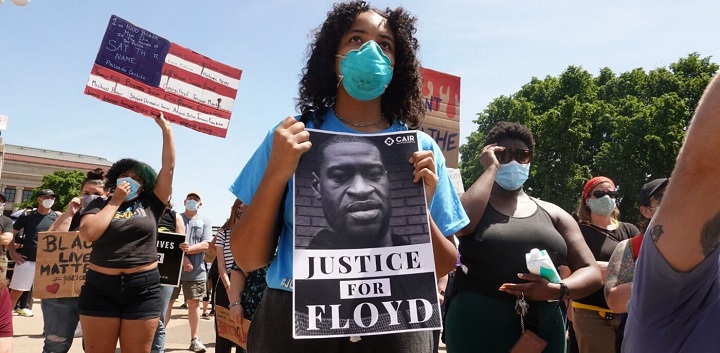
Il consiglio direttivo dell’American Academy of Religion giovedì 4 giugno ha pubblicato un comunicato sulla lotta contro il razzismo negli Stati Uniti.
When a white supremacist entered an African Methodist Episcopal church in Charleston, SC, and executed nine worshippers, the nation was stunned. We vowed to do better. When Tamir Rice, Eric Garner, Deborah Danner, Michael Brown, Alteria Woods, Philando Castile, Atatiana Jefferson, and countless other unarmed black men and women were murdered at the hands of police, protests sprung up in isolated communities and we promised ourselves things would change.
When Ahmaud Arbery was gunned down by two white men while jogging, and Breonna Taylor was shot at least eight times by police in her own home, we again shook our heads and said that something had to change.
On May 25th when a white police officer in Minneapolis pressed his knee into the neck of George Floyd for almost nine minutes while two officers assisted and one stood guard, we watched in horror, unable to believe that the powers of the state were committing a public execution right before our eyes. We knew instantly that our decades-long promises for change rang hollow.
This time, instead of vowing to do better, people across the country took to the streets and an entire nation erupted, as did over 50 countries around the world who joined in protest. Today, we stand in solidarity with the family of George Floyd and the countless other black victims of police brutality and we join with civic leaders and protestors demanding better from this country and from ourselves. The time for the wringing of our hands is over.
Black bodies have been under assault in this country since the very framing of the nation. The extrajudicial violence levied overwhelmingly against black people must stop. Over the past three months, a pandemic has exposed yet again how social and economic inequities that affect black and brown communities make them more vulnerable to illness and death. Police violence and mass incarceration are but two excruciatingly painful facets of those inequities.
As a society of scholars who study religion, who take religion in its social and sacred dimensions seriously, we are deeply grieved by the wrongful loss of life. Great religious leaders across traditions have called on their followers to live up to standards above themselves. As scholars of religion, we draw on the best of those traditions to insist on several responses:
We call on society to live up to our highest civic and religious creeds. In order to do so, we must:
- Strive to learn about the lives and stories of people beyond ourselves. When protestors proclaim “Black Lives Matter” they mean ALL of black life – yes, the physical body, but also the history, the art, the scholarship, the institutions, and the genius of black people matter.
- Vote and cast ballots for candidates that speak beyond our narrow issues, and focus instead on issues that affect those who have been most marginalized in this society. We must ask ourselves, how does this platform affect my neighbor?
- LISTEN to black people. White conservatives AND white liberals, who both are direct beneficiaries of longstanding and deeply embedded systems of white supremacy, must especially take the time to listen.
- Realize that what Dr. Martin Luther King, Jr. taught us is true: “We are caught in an inescapable network of mutuality, tied in a single garment of destiny. Whatever affects one directly, affects all indirectly.” As a society, we cannot afford to ignore those whose enslaved ancestors labored tirelessly under constant threat of violence and death for the building of this country.
We call on our legislators to:
- Enact laws that hold law enforcement accountable for their all too often unfair and unreasonable search, seizure, incarceration, and murder of black people.
- Stop sanctioning political leaders who use religion as a tool to legitimize violence, instigate hatred, and silence disgruntled communities. When politicians use the power of religion as a “photo op” for personal gain, they dishonor our greatest ideals and menacingly make a mockery of the real significance of religion and its moral relevance for our world today. Such actions do violence to individuals and traditions that have been committed to linking social justice to divine justice.
We call on our colleagues in the study of religion and more broadly in the humanities to:
- Recognize the classroom as a source of power in the fight against racism and white supremacy. As AAR members we must affirm our strongest values as an association and commit to understanding how race has shaped and continues to shape our religious and social worlds.
- Integrate the study of race and racialization into our scholarship, our curriculum, and in the training of students of religion.
- Insist on Black religious studies as integral to the study of American religion and thus essential for the conferral of graduate and undergraduate degrees in American religion.
- As scholars of religion, distant though some of our observations may be, our work is wedded to humanity and thus imbued with moral imperatives. Until we call out our own misdeeds and those of the nation, it will be impossible to call us together into community as brothers and sisters. We know better and we must DO better.
AAR Board of Directors





